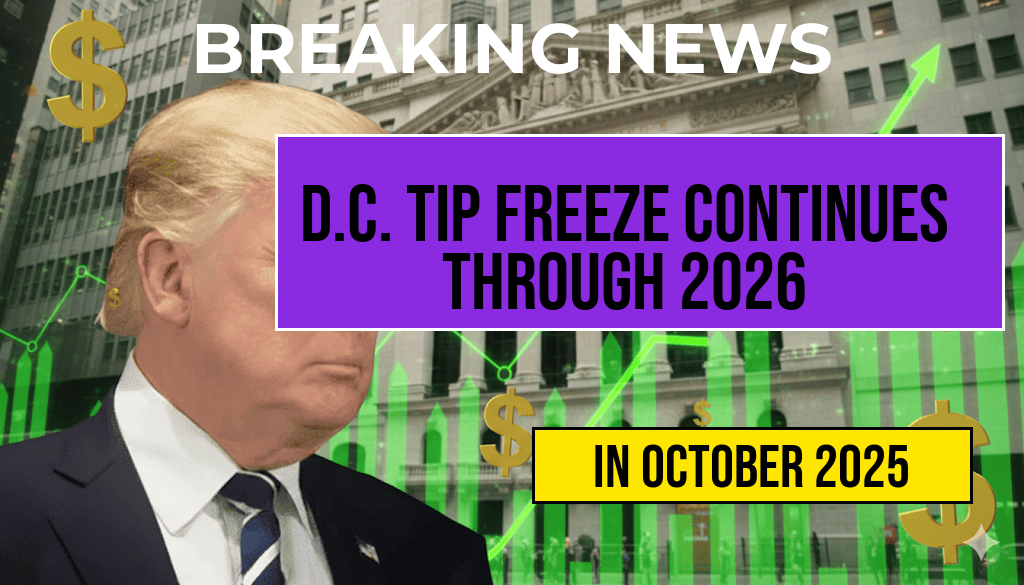D.C. Tip Freeze Through July 2026 Keeps Thousands at $10 an Hour, Offering No Base Wage Increase This Year
The District of Columbia has announced a continuation of its tip freeze policy through July 2026, maintaining the minimum gratuity rate for tipped workers at $10 an hour. This decision comes despite ongoing discussions about increasing the city’s minimum wage, which remains stagnant for tipped employees this year. The policy, initially implemented as a temporary measure during the COVID-19 pandemic, now extends into its third year, impacting thousands of service industry workers who rely heavily on tips for their income. While the city government emphasizes the need to stabilize wages amid economic uncertainties, workers and advocacy groups argue that the freeze hampers earning potential and widens income disparities.
Background of the Tip Freeze Policy
The tip freeze was first introduced in 2021 after the pandemic significantly disrupted the hospitality sector. At that time, city officials aimed to protect small businesses and stabilize employment levels by capping the minimum tip rate at $10 per hour. Since then, the policy has been extended multiple times, with the latest extension announced on June 15, 2023, by the D.C. Department of Employment Services (DOES). According to department officials, the freeze is intended to prevent wage inflation and help small businesses recover from pandemic-related losses.
Implications for Tipped Workers
For thousands of tipped employees—including servers, bartenders, and delivery drivers—the decision to hold the tip rate at $10 means limited income growth. The city’s minimum wage for non-tipped workers is currently $16.10 per hour, but tipped workers are not eligible for a similar increase under the existing policy. Many workers rely on tips to supplement their base wages, which are often below the minimum wage, especially during slow seasons or economic downturns.
| Worker Category | Minimum Base Wage | Tip Rate |
|---|---|---|
| Non-tipped workers | $16.10 | N/A |
| Tipped workers | Varies, often below $10 | $10/hour (frozen) |
Advocates argue that this disparity perpetuates economic insecurity for service workers, many of whom depend on tips to meet basic living expenses. “Keeping the tip rate frozen at $10 effectively caps earnings for workers who already face low wages,” said Maria Lopez, spokesperson for the D.C. Service Industry Coalition. “This policy ignores the rising cost of living and the value of skilled service.” Conversely, opponents of wage increases cite concerns over small business viability and potential employment impacts.
City Officials’ Rationale and Economic Context
City officials maintain that the tip freeze is necessary to support the recovery of the hospitality sector, which was severely impacted by pandemic restrictions and labor shortages. They point out that many restaurants and bars are still operating with tight margins and that increasing tip rates or base wages could lead to higher menu prices or reduced staffing levels.
“Our priority remains balancing economic recovery with fair compensation,” said D.C. Mayor Muriel Bowser in a statement. “Extending the tip freeze allows us to support small businesses while exploring sustainable wage solutions in the future.”
Looking Ahead: Potential for Future Adjustments
While the current extension pushes the tip rate freeze into July 2026, discussions about adjusting wages for tipped workers continue. Labor groups are advocating for decoupling the tip rate from wage policies, arguing that tipped workers deserve a minimum base wage that reflects the cost of living increases. Some city council members have proposed legislation to gradually raise the tipped minimum wage, but no concrete timeline has been established.
For now, workers must navigate a landscape where earning potential remains constrained, and economic pressures mount. The ongoing debate highlights the broader challenge of balancing economic stability with fair labor standards in a city known for its high living costs and vibrant service sector.
Additional Resources
- Minimum Wage in the United States – Wikipedia
- Forbes: Wage Gap and Economic Disparities
- D.C. Department of Employment Services
Frequently Asked Questions
What is the duration of the D.C. tip freeze?
The tip freeze in D.C. will remain in effect through July 2026, preventing any increase in tips during this period.
Will there be a base wage increase for workers this year?
No, there will be no base wage increase for workers in 2024 as a result of the tip freeze policy.
How does the tip freeze affect workers earning $10 an hour?
The tip freeze ensures that thousands of workers who earn $10 an hour will continue to receive this rate without any reduction or increase through July 2026.
What is the reason behind implementing the tip freeze?
The tip freeze was introduced as a measure to stabilize wages and manage economic challenges faced by the hospitality industry in D.C.
Will workers see any changes in their overall compensation during this period?
While tips remain unchanged due to the freeze, overall compensation may be affected since there will be no base wage increase this year, potentially impacting total earnings.

Leave a Reply